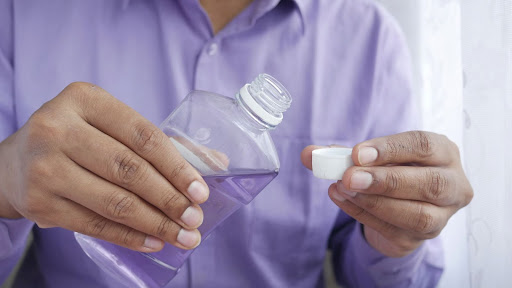
Education is one of the main components of our jobs as professional dental care providers in Saskatoon. We often get asked about the validity and effectiveness of alternative or natural oral care practices that have become popular recently. In this blog, the Blok dentists give their best answers to frequently asked questions about mouthwash and mouth rinse practices.
At Blok Dental clinic, we believe that that good oral health requires these 6 essentials:
- Thorough brushing
- Daily flossing
- A diet based on whole and minimally processed foods
- Avoidance of sugars as much as possible – see How To Protect Your Teeth From Sugar Damage
- Scraping the tongue regularly – see 4 Reasons to Clean Your Tongue Daily
- Frequent visits to professional dental services to examine and remove mineral buildup on the teeth – see The Importance of Regular Dental Check Ups
Notice mouthwash is not on the list! While mouthwash may play a part in supporting good oral health, it should only be used in addition to the above 6 essentials and not as replacement for basic oral hygiene practices. We hope the following answers to frequently asked questions about natural or alternative mouth rinses will be helpful for you in choosing your oral care routine.
Conventional Mouthwash
Q: Will using mouthwash freshen my breath?
A: When used in moderation, mouthwash is great for providing you with additional support in your efforts to reduce bad breath, and to fight cavities and gum disease. The alcohol in conventional dental mouthwash kills germs and bacteria which can help with minor gum irritation, small burns and cuts, canker sores, and other minor trauma in the mouth.
Q: What are the risks of using alcohol-based mouthwash?
A: When used consistently, the alcohol in mouthwash can change the balance of natural bacteria in the mouth—this can create long term problems with unknown effects. It can also lead to dry mouth and exacerbate pre-existing symptoms of dry mouth due to age, medical conditions, or medications. Dry mouth leads to bad breath, decay, or other problems.
Q: What’s the best dentist-recommended mouthwash product?
A: Check out this list of mouthwash products approved by the Canadian Dental Association, which have been proven for safety and effectiveness in regulated lab tests.
Aloe Vera Mouthwash
Q: Should I use aloe vera mouthwash?
A: If you have cuts, burns, bruises or lesions in your mouth, you may benefit from using aloe vera mouthwash. It will also help control inflammation of the gums due to systemic diseases such as diabetes or cancer treatment medications. A person who is generally very healthy with normal gum tissues and relatively minor inflammation may not see effects as noticeable or pronounced as someone using it to actively reduce inflammation in the mouth.
Q: Can aloe vera mouthwash really freshen my breath?
A: Aloe vera is good for you and will not hurt, but won’t necessarily give you fresher breath. It is however great for reducing or controlling inflammation in the mouth.
Q: What are the benefits of aloe vera mouthwash?
A: Aloe vera is a very special plant with natural anti-inflammatory properties that combat any inflammatory reaction in the body, including the mouth! It is most effective in those who already have inflammation on their gums.
Oil Pulling
Q: Does oil pulling have any benefit for my oral health?
A: The roots of pulling oil in the mouth go back to ancient Indian health philosophy with an inherent wisdom that should not be dismissed. There is also a scientific basis for pulling oil: most bacteria have membranes that are made of fat. When the fat membranes of oral bacteria come into contact with other fats, such as coconut oil in the mouth for an extended period, they are drawn to and absorbed by it. The oil in the mouth literally pulls and absorbs bacteria away from the oral environment and into the oil which is then spit out and discarded.
Q: Will oil pulling prevent tooth decay and oral disease?
A: No, it is not a replacement for brushing and flossing. While it is a useful practice with definite health advantages, like other mouthwash practices, oil pulling on its own today will not minimize risks of tooth decay and other oral disease. It is only a preventive measure at best and should never be used as a treatment for an acute issue.
Q: I read that oil pulling was the primary oral care practice in ancient India, why doesn’t it work the same now?
A: Oil pulling by itself may have been a much more effective oral care practice in ancient times when the food was much less processed than it is today, and the diets much simpler than they are today.
Essential Oils Mouthwash
Q: Do essential oils work to prevent bad breath, gingivitis or tooth decay?
A: Essential oils in themselves are beneficial because they are a natural part of the spectrum of what mother nature has given us to deal with ails and pains that we experience. However they should not be relied upon exclusively to address all sorts of problems—this is especially true for oral health problems.
Q: What are the limitations of essential oils mouth rinse?
A: While essential oils can be useful, there’s no scientific evidence that they are. Nor is there a whole lot of anecdotal evidence essential oils are useful at all for oral care. Relying on them can give a person a false sense of security that may prevent them from seeking proper treatment and lead to further jeopardized oral health. At best, using essential oil based mouthwashes are a reasonable adjunct and alternative, but they should be used with full knowledge of their limitations.
Q: Can clove oil applied to the gums treat toothache?
A: While some report reduced toothache pain after applying clove essential oil, we recommend that if you have a toothache you consult with your dentist right away to rule out anything serious.
No kind of mouthwash can replace professional dental services
BLOK dental services include professional cleaning, which we recommend twice annually for optimal oral health. As long as you aren’t using mouthwash to replace any of the 6 essential oral care practices, there’s no major harm in using it, and it may help in some cases. Whether or not you incorporate any kind of mouthwash into your regular oral care routine is entirely up to you. Our best advice is do some research and talk to your dentist before you make any changes to your oral care routine.
